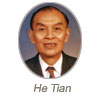AWARDEE OF MATHEMATICS AND MECHANICS PRIZE
BAI YILONG
Abstract
Bai Yilong was born on December 22, 1940 in Xiangyun, Yunnan Province. He graduated from the Chinese University of Science and Technology in spring of 1964. In the same year, he became a graduate student in the Institute of Mechanics, Chinese Academy of Sciences. After graduation, he worked in the Institute for over thirty years. During the period of 1979-1981, he was an academic visitor at Oxford University as well as Cambridge University.
Prof. Bai is the chairman of academic committee of the Institute of mechanics, CAS, the director of National key Laboratory for Non-linear Mechanics, CAS, the president of Chinese Society of Theoretical and Applied Mechanics and the director of the Department of Mathematics and Physics, the National Natural Science Foundation of China. He was elected as a member of the Chinese Academy of Sciences in 1991.
In eighties, Bai made his contribution to the theory of thermo-mechanical shear localization. He derived the model equations governing the thermo-plastic shear deformation and then found that the instability threshold can be formulated with a dimensionless parameter consisting of plastic work, temperature rise, work hardening and thermal softening. Also, it was derived that the thermal plastic shear band is a kind of dissipative structure predominated by coupling plastic work rate and heat diffusion. In recent years, Bai and his colleagues initiated a new technique of submicro-second stress pulse and developed a model equation of microdamage evolution and some special solutions to it. This founded the experimental and theoretical base of the statistical meso-damage mechanics. Moreover, They established the idea of evolution induced catastrophe and explained sample specific behavior and trans-scale sensitivity in failure of materials.
He won a second class Award of National Prize of Natural Science in 1993. His two English monographs “Ductile Fracture and Ductility" and “Adiabatic Shear Localization" ( co-authored by B. Dodd) were published by Academic Press and Pergamon respectively. Prof. Bai was invited to deliver lectures in universities and national Labs in USA, UK, etc. and at international conferences.






